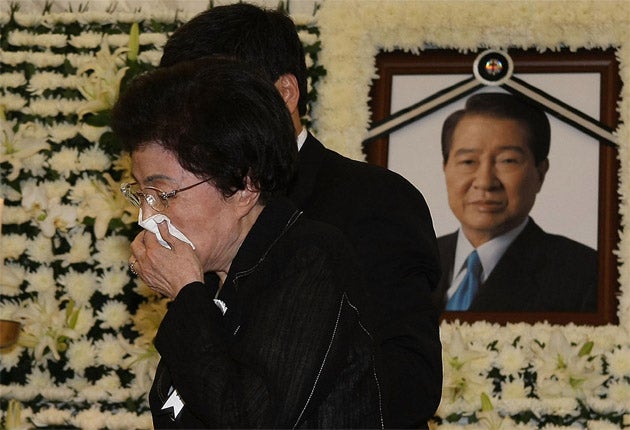South Korea mourns the man who cemented democracy

Your support helps us to tell the story
From reproductive rights to climate change to Big Tech, The Independent is on the ground when the story is developing. Whether it's investigating the financials of Elon Musk's pro-Trump PAC or producing our latest documentary, 'The A Word', which shines a light on the American women fighting for reproductive rights, we know how important it is to parse out the facts from the messaging.
At such a critical moment in US history, we need reporters on the ground. Your donation allows us to keep sending journalists to speak to both sides of the story.
The Independent is trusted by Americans across the entire political spectrum. And unlike many other quality news outlets, we choose not to lock Americans out of our reporting and analysis with paywalls. We believe quality journalism should be available to everyone, paid for by those who can afford it.
Your support makes all the difference.The former South Korean president Kim Dae-jung, a man who spent years as a dissident under the country's military dictatorship and later won the Nobel Peace Prize for seeking reconciliation with communist North Korea, has died. He was 85.
The man considered a huge figure in the country's transformation to democracy and who was popularly known by his initials DJ, died of a heart attack, officials said. He was admitted to hospital last month suffering from pneumonia. News of his death brought immediate tributes from both his allies and those who did not agree with the liberal leader's so-called Sunshine Policy of seeking to negotiate with the North Koreans.
"We lost a great political leader today. His accomplishments and aspirations to achieve democratisation and inter-Korean reconciliation will long be remembered by the people," President Lee Myung-bak said.
Mr Kim, a former political prisoner who was once sentenced to death under military rule, was elected South Korea's president in December 1997 on his fourth attempt. It was the first time that power had shifted from a ruling president to one from the opposition and firmly established democracy in a country that had spent its early years under a succession of autocratic rulers.
The culmination of his efforts to engage with North Korea came in 2000 when he flew to Pyongyang for an historic summit with the North Korean leader Kim Jong-il. The meeting and his idea of pushing the North forward with the promise of incentives led to him being awarded the Nobel Prize.
His policy of rapprochement was continued by his successor Roh Moo-hyun who held a second summit with Kim Jong-il in 2007. However, in late 2007 after a decade of liberal politics, South Korea's voters turned instead to the conservative Mr Lee.
Join our commenting forum
Join thought-provoking conversations, follow other Independent readers and see their replies
Comments